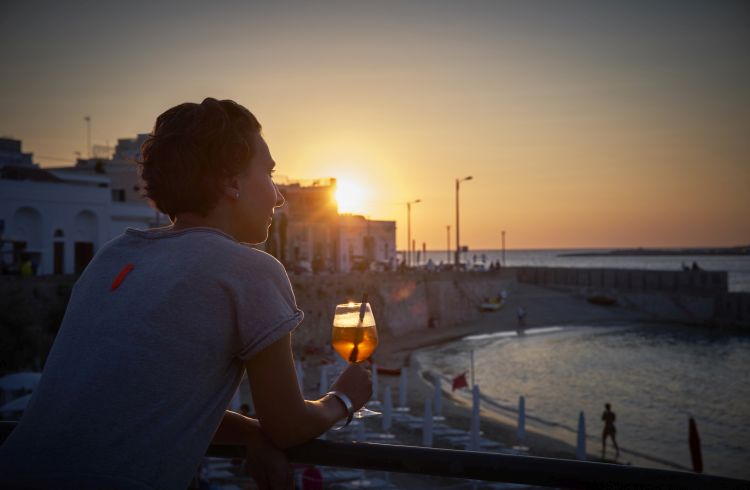How to Avoid Drink Spiking: Essential Travel Safety Tips
Drink spiking can affect any traveler anywhere in the world. Bryn Bailer shares her story, plus advice to help you avoid having your drink spiked on a night out.
 Photo © GettyImages/Westend61
Photo © GettyImages/Westend61
When I came back to the table, my cocktail was already there. Ice sparkled prettily in the clear, bubbly soda water, while springs of fresh, green mint peeked out between generous slices of lime. Something was a bit off, though. I hadn’t ordered it.
I had been living in Prague for a few months, working at an English-language business magazine, and was thoroughly intoxicated by the Golden City and its many Czech complexities. But I still didn’t speak much Czech, so when a visiting teacher, who said he was from New Zealand, invited me for a drink, I eagerly accepted.
Unfortunately, it turned out to be an uncomfortable encounter. He guided me to a corner table inside a noisy, dimly lit neighborhood bar, and the evening mostly involved dodging his many attempts to get me drunk, and back to his flat, “just around the corner.”
At one point, the verbal jousting got to be so exhausting that I picked up my drink – a virgin mojito – and took it with me to the ladies room.
When I returned a few minutes later (drink still in hand), he had a brand new mojito waiting for me. I cheerfully declined it and suggested that he drink it instead. To my surprise, he immediately refused, becoming so angry that I ended the date – leaving the new drink untouched, and leaving the bar with my sobriety (and most likely, personal safety) intact.
What is drink spiking?
Drink spiking – adding alcohol to someone’s beverage without their knowledge – is nothing new. When narcotics are introduced into the mix, the effects can be deadly, and devilishly hard to detect. The most frequently used incapacitating drugs – central nervous system depressants Rohypnol and Gamma-hydroxybutyrate (GHB), and the surgical anesthetic Ketamine – are colorless, odorless and virtually tasteless. Perfect for dumping into someone’s beverage undetected.
Although it’s difficult to determine exactly how big the problem is, drink spiking happens often enough that the UK’s National Health Service has mounted official warning campaigns against it. It doesn’t help that “date rape drugs” are so readily available, and can easily be purchased online from dealers overseas.
According to Giorgio Fadda, Vice President of the International Bartenders Association (which represents members from 65 countries) spiking happens worldwide. “The tragic phenomenon is spreading,” says Fadda. “Adding psychotropic substances to another person's drink is a form of violence, and one of many ways to control, manipulate, and bend the will of a person.”
What to do if your drink is spiked
When traveling, drink spiking can be used to distract you from theft, or to physically impair you in preparation for robbery, unwelcome sexual advances, or sexual assault. Men are also at risk. Some fast-acting drugs can take effect in as little as 15 minutes, resulting in severely impaired judgment, hallucinations, difficulty moving, speaking and breathing, and temporary paralysis.
The incapacitation can last for hours, and some drugs also cause blackouts and memory loss, which is another reason they are used to carry out additional crimes.
Unfortunately, the initial warning signs of predatory spiking mimic conventional alcohol intoxication, says clinical toxicologist, Steve Dudly, of the Arizona Poison and Drug Information Center. The 24-hour, toll-free hotline for poison-related emergencies is operated by medical experts from the University of Arizona College of Pharmacy, and handles about 37,000 calls annually.
“Generally, when people’s drinks are spiked, it [is a result of] a sedative-hypnotic,” he explains. “Symptoms include drowsiness, slurred speech, extreme sluggishness, and loss of consciousness.”
Tips to avoid drink spiking
While other drugging methods do exist – like spiking cannabis edibles with a strong narcotic like Ecstasy, or lacing cigarette tobacco with PCP or marijuana – drinks are the quickest, easiest option for criminals, says University of Central Florida Police Department Commander, James Mangan. His department investigates drug- and alcohol-related sexual assault cases on the college campus each semester.
He and Dudly suggest taking the following precautions:
- Buy your own drinks, and don’t leave them unattended
- At parties, avoid easy-to-spike punchbowls in favor of unopened bottled drinks
- Travel with friends you trust, and use the buddy system to watch out for each other
- If going out alone, let someone know where you’re headed, and when you expect to be back
- Don’t flash cash or expensive equipment that could attract thieves’ attention
- If you think you’ve been spiked, immediately contact someone you trust, and/or bar management or security staff
- Make plans to get to a safe place, but don’t accept rides from strangers while incapacitated
- If all else fails, contact emergency services yourself. And let others know, so they can guide paramedics to your location if you pass out.
“The hardest thing for people to get over are thoughts that they might have been responsible for their own attack,” Mangan says. “They need to realize it’s not their fault.”
Related articles
Simple and flexible travel insurance
You can buy at home or while traveling, and claim online from anywhere in the world. With 150+ adventure activities covered and 24/7 emergency assistance.
Get a quote

No Comments